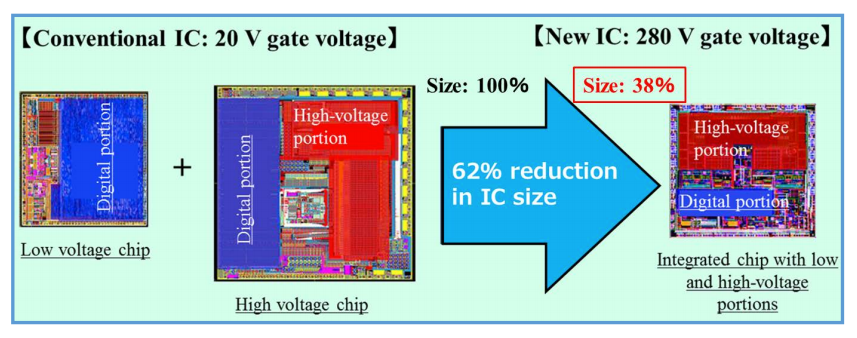Deep Sub-Micron Process MOSFETs with Maximum Gate Voltage of 280 V for Li-ion Battery Management IC
Category: IT/Electrical
Developers: Toyota Central R&D Labs, Inc.
Co-Developers: DENSO CORPORATION
Japan
Product Description:Joint research by Toyota Central R&D Labs and DENSO CORPORATION has developed a new Deep Sub-Micron Process MOSFET for a new Li-ion battery management IC. Although the new IC size is only one-third of the size of a conventional IC, it can monitor battery cells with 1.2x higher capacity than the conventional IC. Development of high gate voltage MOSFETs is necessary for size reduction because the number of battery cells that must be monitored in an electrified vehicle is expected to increase in the future. This project achieved the world’s first 280V high gate voltage MOSFET by adoption of STI for the gate oxide layer. Durability of the developed MOSFET was verified under practical conditions. Starting from 2020, these MOSFETs will be mounted on the high-voltage portion of a new Li-ion battery management IC in the BMU for HEVs. The newly developed Li-ion battery management IC can also be adopted for applications other than vehicle technology, such as electrification systems for aircraft and home energy management systems (HEMS).
Developers: Toyota Central R&D Labs, Inc.
Co-Developers: DENSO CORPORATION
Japan
Product Description:Joint research by Toyota Central R&D Labs and DENSO CORPORATION has developed a new Deep Sub-Micron Process MOSFET for a new Li-ion battery management IC. Although the new IC size is only one-third of the size of a conventional IC, it can monitor battery cells with 1.2x higher capacity than the conventional IC. Development of high gate voltage MOSFETs is necessary for size reduction because the number of battery cells that must be monitored in an electrified vehicle is expected to increase in the future. This project achieved the world’s first 280V high gate voltage MOSFET by adoption of STI for the gate oxide layer. Durability of the developed MOSFET was verified under practical conditions. Starting from 2020, these MOSFETs will be mounted on the high-voltage portion of a new Li-ion battery management IC in the BMU for HEVs. The newly developed Li-ion battery management IC can also be adopted for applications other than vehicle technology, such as electrification systems for aircraft and home energy management systems (HEMS).

Conventional and New Battery Management ICs
